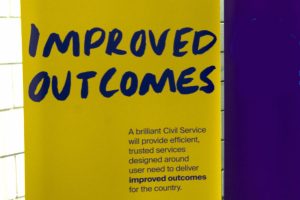
Ask most people what the biggest change they’ve seen in their lifetime has been, and I bet a fair proportion would mention the introduction of digital tools and ways of working. I can still remember the first word processors and have seen first-hand the shift to increasingly high-powered and pocked-sized devices. Great news for our efficiency – perhaps less good for our work/life balance, but that’s a topic for another day.
At HMRC, until recently, we’d have struggled to claim that our services (both internal and external) have kept pace with the most cutting-edge modern workplaces. That’s changing though, and we’re now providing digital services that our customers want to use, and IT that makes our people’s jobs easier. Last year we won Digital Project of the Year at the UK IT Industry Awards, a prize we competed for with some of the biggest organisations in the industry, and we aren’t slowing down in 2016.
Just this month we hit a major milestone for our Personal Tax Account (PTA): we’ve now got more than 2 million citizens signed up. The PTA means for the first time anyone can log in, check their tax information and manage their details online and in one place. We also have more than 5 million users of our business tax account and are looking at making it even easier for our customers to do business with us online. In fact, our digital team has 28 new online services in development.
Real-time approach
We’re moving away from more traditional processes, such as responding to customer queries by letter, to a much more real-time approach, where people can keep track of their tax affairs at any time by logging onto their account. The advantages will be significant and far-reaching – for example, our Needs Extra Support team who work with our most vulnerable customers recently told me how excited they are about the benefits of the PTA for our deaf customers. And a new app, only a few weeks from launch, is for those who find that an even more convenient way to do business with us.
 Recently, I went to Newcastle to visit one of our six Digital Delivery Centres. The team there were working on our online tax credits renewal service. I was impressed by their total focus on the needs of our customers. They’d produced a chart of the emotions customers feel at different phases of the renewals process (everything from frustration and fear, to relief and happiness), and they were mapping possible digital interventions against each, to make sure we’re doing everything we can to support our customers at every point in the process.
Recently, I went to Newcastle to visit one of our six Digital Delivery Centres. The team there were working on our online tax credits renewal service. I was impressed by their total focus on the needs of our customers. They’d produced a chart of the emotions customers feel at different phases of the renewals process (everything from frustration and fear, to relief and happiness), and they were mapping possible digital interventions against each, to make sure we’re doing everything we can to support our customers at every point in the process.
It was fascinating, and I’d recommend a visit to anyone! The team were also making impressive use of behavioural science, mapping the frustrations of customers against our own team’s frustrations with processes. In many cases, they were the same, and the team tackles those issues on a rapid spin-cycle, adapting and changing as they develop the system.
Modern internal systems
 In delivering even better services for HMRC’s customers, I’m really keen that we make our internal systems just as modern and intuitive as our customer-facing ones. I’m convinced that the way we achieve that is by giving our people as much input into the design of the systems they use as possible. Over my first few months, I’ve spent a lot of time on the road, meeting the people who answer customer calls, work on compliance cases or manage relationships with the UK’s large businesses. I’ve been struck by their exceptional knowledge and commitment. They are our greatest resource. It’s that knowledge that’s helping us build responsive, well-designed services for customers, and it’ll help us make sure that our internal IT is equally innovative.
In delivering even better services for HMRC’s customers, I’m really keen that we make our internal systems just as modern and intuitive as our customer-facing ones. I’m convinced that the way we achieve that is by giving our people as much input into the design of the systems they use as possible. Over my first few months, I’ve spent a lot of time on the road, meeting the people who answer customer calls, work on compliance cases or manage relationships with the UK’s large businesses. I’ve been struck by their exceptional knowledge and commitment. They are our greatest resource. It’s that knowledge that’s helping us build responsive, well-designed services for customers, and it’ll help us make sure that our internal IT is equally innovative.
We’re making good progress. Our Digital Mail System – which I’ve seen in action around the country – was designed and tested by the people who actually use it every day. And we’re planning to move to a system where all our staff can click a button to give feedback on an internal page or system, just like our customers can.
“Look after your staff…”
Hardware-wise, HMRC people are working on dual screens, enabling them to switch instantly between applications, and using Blackberries and Surface Pros, so we’ve made good progress there. I think this is incredibly important, not least because it’s difficult to get excited about an HMRC app for customers if you’re still using significantly outdated technology.
There’s a Richard Branson quote that someone mentioned to me soon after I joined HMRC: “look after your staff, they’ll look after your customers”. That’s why it’s important that the services our people log onto every day are just as good as the services our customers use. Developing high-performing internal systems is all about learning from the people who know best. We still have a long way to go, with more than 300 business applications in use, but over the next few years we’ll work hard to improve and consolidate them.
Our digital customer services are deserved award winners. Soon, I hope that our internal digital services will be too.
Follow Jon on Twitter: @JonThompsonHMRC.

13 comments
Comment by Lydia Smith posted on
As a humble tax payer I do support the bravery of HMRC in posting such blogs as it gives us quite an insight into things. Thank you.
I expect the other digital changes to mean much more work for the self employed tax payer, communicati9ng data to HMRC 4 times not once a year and all the while the state and HMRC pretending it will be so much easier for the self employed so it feels extremely Kafkaesque at present but perhaps I will be pleasantly surprised.
If we are require to give up use of word, excel and notebooks to keep our accounts though there will be utter uproar. That propose is not on and will not be accepted by tax payers. We will not buy and use expensive or even free software products for the convenience of Government or HMRC to keep our accounts. It is a total non starter. It is the step too far.
Comment by winston smith posted on
Could you perhaps stop tinkering with the services that we have that work perfectly well as they are? It seems every day there is some new layout or format which adds nothing and is just irritating. Surely there are higher priorities than constantly fussing with the appearance of things; smacks of style over substance.
Comment by Simon posted on
Digital services are the way of the future, and I know I've pushed for IT automation wherever possible during my 20+ years in HMRC.
However, that has to be balanced against both staff and customer IT knowledge. We can be using the very latest technology, coupled with the newest Operating System and the newest version of Office.
But I know from experience that peoples IT skills can be a real stumbling block. That isn't a criticism of anyone, merely an observation based on experience.
Many would benefit from at least basic face to face training, as I've often helped people out who couldn't get to grips with online learning, and this helped show them how IT solutions could be applied to their daily work. (For some, this was as 'simple' as showing them how to use autosum in Excel).
So I worry that at least some staff and customers will be left in the cold with these changes. I know firsthand that moving from Win XP to Win 7 caused issues for some, and the change from Office 2003 to the ribbon based Office 2013 really caused confusion.
So a definite yes to digital services, but this needs to be combined with A+ training, or many could be left struggling and barely utilising the power of new technology and software.
As a footnote, I agree with Craig so I'll also apologise. I also don't think giving staff the IT systems they need to do their jobs constitutes 'looking after your staff.'
It can form a part of looking after staffs work needs, but reliable effective IT is the minimum that should be expected from any large employer.
The quote itself forms part his wider comments, and can be seen in one of Richard Bransons interviews ( http://www.inc.com/eric-schurenberg/sir-richard-branson-put-your-staff-first-customers-second-and-shareholders-third.html )
"It sort of should go without saying -- and it's surprising that it still doesn't go without saying at some companies -- if the person who works at your company is 100% proud of the job they're doing, if you give them the tools to do a good job, they're proud of the brand, if they were looked after, if they're treated well, then they're gonna be smiling, they're gonna be happy and therefore the customer will have a nice experience. If the person who's working for your company is not given the right tools, is not looked after, is not appreciated, they're not gonna do things with a smile and therefore the customer will be treated in a way where often they won't want to come back for more. So, my philosophy has always been, if you can put staff first, your customer second and shareholders third, effectively, in the end, the shareholders do well, the customers do better, and yourself are happy."
Comment by Phil Taylor posted on
Jon, you "encourage people to visit"..... if only T&S was available to people at lower grades to enable them to visit other offices and observe new ways of working etc....I'm afraid that such trips are an no go to most staff.
Comment by Craig posted on
Apologies but I don't think giving staff the IT systems they need to do their jobs constitutes "looking after your staff". This is just the provision of the tools necessary for staff to be able to do their work effectively, which is the minimum we should expect from an employer
Comment by Mike posted on
Jon
In your previous blog you had spoken about getting rid of things that get in the way of staff doing their work. As you must know by now, systems such as Caseflow are a huge issue for staff as it is extremely time consuming and of absolutely no benefit to the staff tasked with updating it. Now you are talking about working hard to improve and consolidate systems. I do hope you have not fallen into the trap of believing those who would have you think Caseflow could ever be improved. Forget about improvements, get it scrapped.
Comment by Colin posted on
Hi @Mike (commenting on Caseflow2) - if you want to get in touch, I'm leading the Improving Case Management Programme and would love to hear why/how Caseflow2 isn't working for you. I know from lots of surveying that new users and most of our existing users find the revised system better (but not perfect!), but your views seem to run counter. I'd love to understand what it is in your area or circumstances that make it not work for you, so we can ensure our future systems do fit. You can reach me on the GAL as Colin Tweddle (Compliance for the Future).
Comment by Natalie Carter Bonsu posted on
To Mike,
My name is Natalie Carter Bonsu and my team engage with caseflow users across HMRC. I need to ensure our users are getting the most out of the system. Please feel free to contact me through the GAL, my team would be very happy to meet with you and discuss any concerns you may have.
Thanks
Natalie
Comment by Owen posted on
"I’ve been struck by their exceptional knowledge and commitment. They are our greatest resource."
Unfortunately we often find ourselves jumping through hoops of quality checking which look at processes and tick boxes but not the actual content of the work or result for the customer of the work being checked.
We also find ourselves having to focus on buzz-word laden PMR systems that don't really feel enabling because they take us away too much from and feel unrelated to the core work we want to do and enjoy doing, bringing in the money, providing the tax credits, serving the public.
The butterflies and rainbows of the new technology and digital processes are very pretty, but feel difficult to enjoy when your feet are stuck in the heavy mud of the management systems. I think this is a major part of the poor scores that are shown in some areas of our surveys.
Comment by Max posted on
Efficiency and work/life balance is a topic that needs to be addressed immediately. There is plenty of evidence of managers who see the existence of phones and tablets as an indicator that a person is never truly away from their desk. I have heard of managers suggesting that people should stay in touch via e-mails etc. despite being on holiday. Comments please and soon.
Comment by Ade posted on
We are still waiting for Dual Screens where I am.
Comment by Adam posted on
You mention that you are looking to consolidate some of the 300 internal systems, which ones in particular?
Comment by Jack posted on
You mention that "our digital team has 28 new online services in development".
Is it possible to expand on what those services are please.